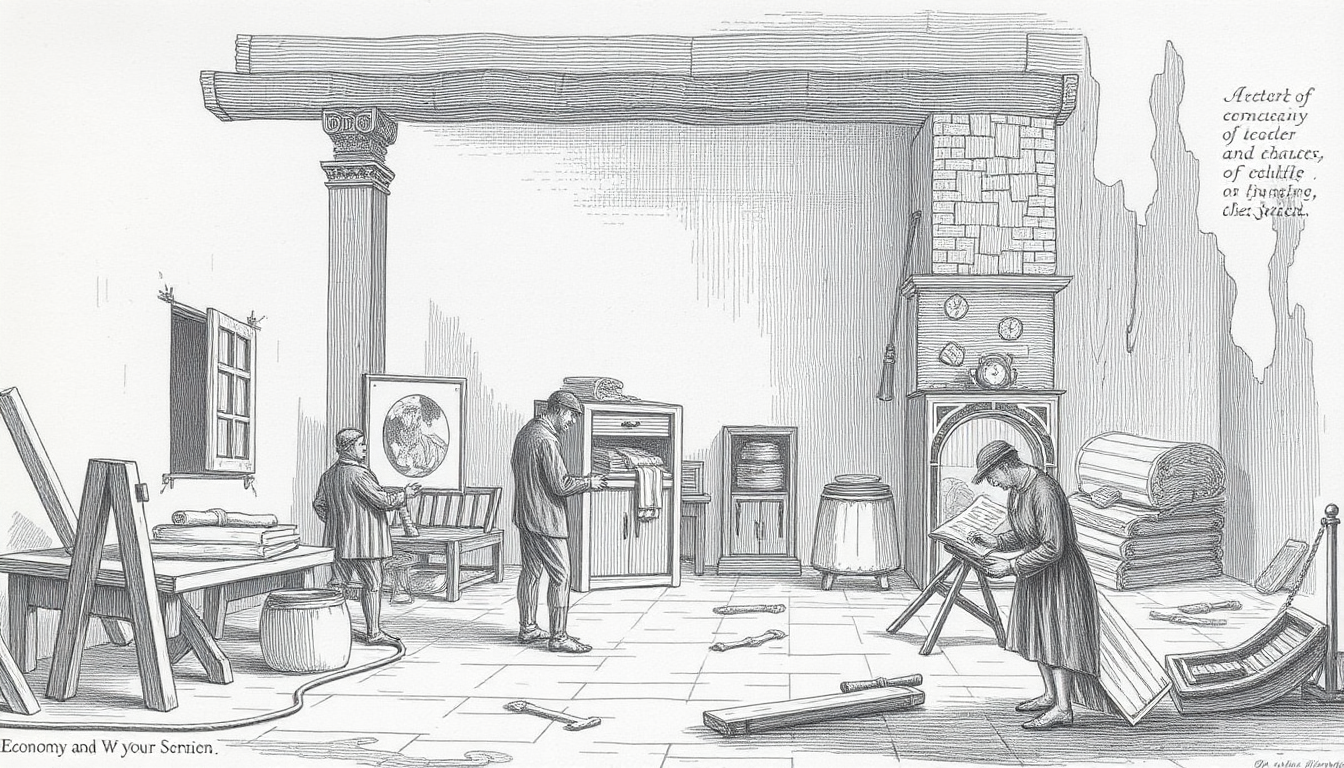Chapter 8: Economy and Work
The 18th century was a period of significant economic change in England, with the beginnings of the Industrial Revolution. This chapter explores the various aspects of work and economy during this time.
Trades and Professions
A wide range of trades and professions existed in 18th century England. Dr. Claver Morris’s diary provides insight into the life of a physician:
I went from Somerton about 7 (being called for) on Mr. Fry’s daughter Frances at Yearly in Membury in Devonshire ..I rode by Cricket and called in on Mrs. Pitt… and I came to Mr. Fry’s about 5.
Strother, a draper’s assistant, gives us a glimpse into retail work:
Paid Sansby the barber, 4s. for quarter of a year dressing on Sunday, Tuesday, and Thursday every week; 8d. for half pound of Marechal Powder, 2d. for a paper box 6 inches by 3 and 3 high.
Agriculture
Despite growing industrialization, agriculture remained a significant part of the economy. Thomas Marchant, a farmer, records his daily activities:
A Dinner was made for the Plowmen who brought home this day 8 Wagon loads of Hay from my East-Maar-Mead, & one Load Yesterday.
Shopping and Commerce
Shopping was becoming an increasingly important activity, especially for the middle and upper classes. Nancy Woodforde describes a shopping trip:
This afternoon one Mr. Burden and his wife call’d with muslins, Chintz patches for gowns, Cambricks etc. I bought a worked muslin apron for which I gave six and nine pence and for half a yard of muslin three shillings and threepence.
Currency and Finances
Understanding of personal finance varied. Dudley Ryder shows concern about money management:
While I was in bed remembered that I had left my sword below in the parlour. It made me uneasy all night and dream of it for fear that thieves should come in and take it away. I am concerned at this solicitous temper of mine, I am afraid it should grow upon me with age, and if it should riches and wealth will be always a burden to me for fear of loosing them.
Gambling and Lotteries
Gambling was a common activity, often intertwined with business. Dr. Claver Morris mentions participating in a lottery:
I pay’d Mr. Lucas the Difference of the Blank Ticket in the last Year’s Lottery which was sold for £7-8s, from what was bought for me now at £10-19s-6d; which was £3-11s-6d. And my Number is -12567. Mr. Lucas’ Number is 12566.
Industrial Revolution
The beginnings of the Industrial Revolution were becoming apparent. James Lackington describes a washing house in Glasgow:
Many of them give a trifle to be accommodated with the use of a large washhouse near the water, where about a hundred may be furnished with every convenience for their purpose.
Class Divisions and Social Mobility
While class divisions remained strong, some social mobility was possible. William Holland mentions a former servant who had risen in status:
William Tutton here, an old servant of mine and Clerk of Monkton Farley and married to another old servant, Sarah Castle, by whom he has two or three hundred pounds. In short he is now a considerable man, receives Tithe for me and is employed by the Dowager Duchess of Somerset in various matters.
Women in the Economy
While opportunities were limited, some women played active roles in the economy. Elizabeth Purefoy managed household finances and made business decisions:
My son desires you will subscribe four pounds for four lottery tickets for him, & he will return you the money for the other subscription in due time.
In conclusion, the economy of 18th century England was diverse and changing. Traditional agricultural work continued alongside growing commerce and the beginnings of industrialization. While class divisions remained strong, there were opportunities for social mobility. The period saw the foundations being laid for the dramatic economic changes that would come with the full force of the Industrial Revolution in the following century.
